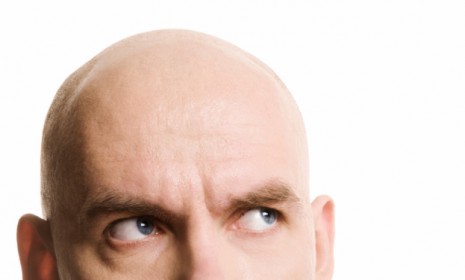Why bald men never went extinct: 4 theories
A full head of hair is important: It keeps the body warm, offers protection from the sun, and it's sexy. So how come glabrous men are still around?

A free daily email with the biggest news stories of the day – and the best features from TheWeek.com
You are now subscribed
Your newsletter sign-up was successful
Men have been vainly searching for a way to cure baldness for at least 3,500 years, says Rob Dunn in New Scientist, pointing to an ancient Egyptian papyrus outlining an anti-baldness recipe that blends iron oxide, lead, alabaster, onions, honey, and fat from a snake, crocodile, hippopotamus, and lion. But those hair-challenged Egyptians, and today's bald men, should just be happy to be alive. Given that since the dawn of man, a full head of hair has helped "protect us from the noonday sun, maintain body heat when it is cold, and even attract a mate," chrome-domed men should be at an evolutionary disadvantage. "Why, in other words, haven't bald men gone extinct?" Here, four theories:
1. Baldness signals maturity and gravitas
Balding men are "associated with wisdom and nurturance," say Frank Muscarella and Michael Cunningham in the journal Ethology and Sociobiology. Granted, they are also seen as older and less physically attractive, but longevity in itself is an attractive trait in a mate, says Dunn.
The Week
Escape your echo chamber. Get the facts behind the news, plus analysis from multiple perspectives.

Sign up for The Week's Free Newsletters
From our morning news briefing to a weekly Good News Newsletter, get the best of The Week delivered directly to your inbox.
From our morning news briefing to a weekly Good News Newsletter, get the best of The Week delivered directly to your inbox.
2. Empty pates protect men from disease
Everyone agrees that "male pattern baldness exposes a relatively large skin area to sunlight during everyday activity," says Peter Kabai in Medical Hypotheses. While this may sound like a risk factor, baldness might well be "a finely tuned mechanism evolved to protect against prostate cancer," since studies show that absorbing solar ultraviolet radiation and vitamin D helps prevent that particular disease. Prostate cancer not only kills men early, but also interferes with reproduction.
3. It's a billboard for vigor
Another theory is that baldness actually "signals dominance and status," says Dunn. The idea here is that a bald pate serves "as a sort of advertising board for emotions, in particular the red flush that accompanies anger." We know that with other animals, "red is often the color of dominance," so an "angry bald head" would be read by sexual rivals as "a wordless but very clear statement of 'Don't mess with me!'"
A free daily email with the biggest news stories of the day – and the best features from TheWeek.com
4. Baldness has nothing to do with evolution
Sorry, depilated men, but "there isn't an evolutionary advantage or disadvantage in male pattern baldness, it's just one of those things," says Susan Deal in Britain's The Guardian. Most men start balding after age 30, and in the scope of human history, that's past the "usual age of reproduction." And, in terms of evolution, "I'm afraid nature has little or no interest in the individual after they have reproduced." In other words, says Jamie Condliffe at Gizmodo, "nobody knows for certain why bald men still exist, any more than they can account for your pinky toe hanging around."
-
 El Paso airspace closure tied to FAA-Pentagon standoff
El Paso airspace closure tied to FAA-Pentagon standoffSpeed Read The closure in the Texas border city stemmed from disagreements between the Federal Aviation Administration and Pentagon officials over drone-related tests
-
 Political cartoons for February 12
Political cartoons for February 12Cartoons Thursday's political cartoons include a Pam Bondi performance, Ghislaine Maxwell on tour, and ICE detention facilities
-
 Arcadia: Tom Stoppard’s ‘masterpiece’ makes a ‘triumphant’ return
Arcadia: Tom Stoppard’s ‘masterpiece’ makes a ‘triumphant’ returnThe Week Recommends Carrie Cracknell’s revival at the Old Vic ‘grips like a thriller’